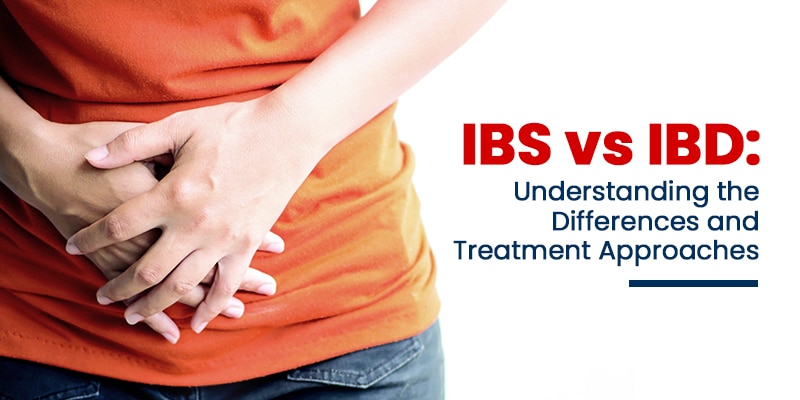- Open 24/7
- psh@paruluniversity.ac.in
- Emergency Contact - 9016668241/9016668136/18008899774

Digestive health is a major part of your overall well-being. If your gut does not work properly, it affects your energy, food habits, and daily life. You may feel pain, discomfort, or notice changes in your stool.
Some people live with these problems for months. Many do not know whether they have IBS or IBD. These are two common gut conditions. Their names sound similar, but the causes and treatments are very different.
This blog helps you understand these conditions and how to manage them correctly. If you have gut issues, this can help you decide when it is time to visit a gastroenterology hospital in Gujarat.
IBS stands for Irritable Bowel Syndrome. It is a disorder that affects how your bowel works. It is not a disease and does not damage the intestines. IBS is a functional problem. The bowel may move too fast or too slow. This causes pain, gas, and changes in stool.
Pain or cramps in your belly
Gas and bloating after meals
Loose stool or hard stool
A feeling of not emptying the bowel fully
Mucus in the stool
These symptoms often get worse after stress or eating certain foods. You may feel fine for a few days, and then the problem returns. IBS is not life-threatening, but it can make you feel tired and uncomfortable often.
Doctors diagnose IBS using your symptoms and medical history. They rule out other diseases. You may be asked to avoid certain foods or take some basic blood and stool tests. In some cases, doctors suggest a colonoscopy to rule out IBD or cancer. The goal is to check that there is no swelling or damage to the bowel.
IBD stands for Inflammatory Bowel Disease. It is not the same as IBS. IBD causes swelling, sores, and bleeding inside your digestive tract. It is a group of diseases, mainly:
Crohn’s Disease – Affects any part of the digestive tract. It can affect both the small and large intestines. It causes deep damage and can reach all layers of the bowel wall.
Ulcerative Colitis – Affects only the large intestine and rectum. It causes shallow ulcers and bleeding in the lining of the colon.
Blood in the stool
Loose stool that comes again and again
Weight loss without trying
Ongoing fever
Pain in the lower stomach
Fatigue and low energy
Poor appetite
Unlike IBS, IBD causes damage that can be seen in tests. These symptoms are more serious and need long-term care. Delayed treatment leads to more damage, infections, and even surgery in some cases.
IBS and IBD affect the gut, but they are not the same. You must know how they differ so that you get the right treatment.
|
Feature |
IBS |
IBD |
|
Type |
Functional disorder |
|
|
Damage to the intestines |
No visible damage |
Visible damage and ulcers |
|
Risk of long-term harm |
Low |
High |
|
Cause |
Gut sensitivity, food, and stress |
Autoimmune response, infections |
|
Tests |
Fewer (based on symptoms) |
Many (blood, stool, colonoscopy) |
|
Treatment |
Diet, stress control, and mild medicine |
Strong medicine, surgery, and follow-up |
Fried or spicy foods
Caffeine and alcohol
Stress or anxiety
Poor sleep
Infections
Smoking
Some medicines
Autoimmune changes
IBD is more serious and needs regular checks. IBS can be managed better with lifestyle changes.
Once the diagnosis is clear, treatment can begin. Each condition has its own plan. Some patients need a mix of medicine, diet changes, and support. At a specialist gastroenterology hospital in Gujarat, you will get expert care for both.
You do not need strong medicines for IBS in most cases. The goal is to reduce symptoms and make bowel movements regular.
Treatment includes:
Eating smaller, regular meals
Avoiding gas-forming foods
Low FODMAP diet
Drinking more water
Exercise and daily walks
Stress control through yoga or counselling
Probiotics for gut health
Antispasmodic or stool-softening medicine
The doctor also teaches you to track your food and bowel movements. This helps to adjust your treatment over time.
IBD needs a long-term care plan. You may need strong medicine to reduce gut swelling.
Treatment includes:
Anti-inflammatory drugs
Immune-blocking drugs
Biologics (advanced injections)
Nutritional support during flare-ups
Iron, calcium, and vitamin supplements
Surgery if the bowel is badly damaged
Regular colonoscopy to check the colon
Some patients stay on medicine for years. The treatment lowers symptoms and prevents flare-ups. A gastro care hospital in Vadodara, like Parul Sevashram Hospital, has all the tools for proper IBD care.
Many people ignore early signs. But digestive diseases often grow worse over time. Do not delay if you see any of these:
Pain in your stomach for over one week
Stool that changes from normal to very loose or hard
Blood or mucus in your stool
Tiredness that does not go away
Weight loss without trying
Discomfort after eating or passing stool
A gastroenterologist will do the right tests and give a care plan. The goal is to manage symptoms and protect your gut health.
Parul Sevasharm Hospital offers trusted care for IBS, IBD, and other gastrointestinal disorders. The hospital supports patients through advanced tests, skilled doctors, and round-the-clock services. Many people from Gujarat and nearby regions choose it for gastro care in Vadodara. You get care that balances medical science and patient comfort.
Gut health is more than just digestion. It affects how you feel, how you eat, and how you live. IBS and IBD are both serious in their own way. One affects how the bowel works. The other causes damage inside the gut. Both need proper care.
If your symptoms last or get worse, do not ignore them. Early care gives you relief and helps avoid long-term problems. Get the right advice. Take action early. Let your digestive system work the way it should.
Written by Parul Sevashram Hospital | 8 April 2025

